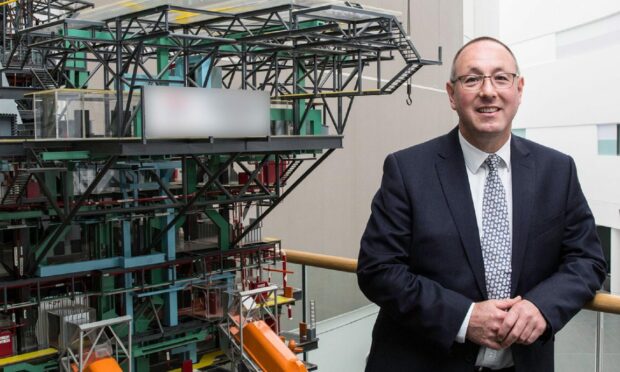Developers behind the plans for an energy transition zone (ETZ) in Aberdeen have announced the establishment of a skills and training partnership for jobs in the emerging net zero energy industry.
A number of partners have joined forces to establish the National Energy Skills Accelerator (NESA), which is expected to provide a “one stop shop” for industry to access courses, skills development programmes and R&D capabilities to train workers for the energy transition.
NESA will form part of the ETZ in Aberdeen, which is being earmarked for land next to the new £350m South Harbour. The ETZ project has secured nearly £80million in government funding, including £26m from the Scottish Government’s energy transition fund announced earlier this month.
The NESA is a collaboration between Robert Gordon University (RGU), the University of Aberdeen and the North East Scotland College (Nescol), supported by government agency Skills Development Scotland (SDS) and Energy Transition Zone Ltd, the company leading the development of the ETZ. The firm said it “anticipated that other partners may join NESA over time”.
Paul de Leeuw, who is the director the Energy Transition Institute at RGU is also chair of the NESA development board. He said the NESA was a “collaborative umbrella organisation” that would help to reduce “duplication” by “enabling partners to work better with industry to promote, align and deliver skills development offerings and programmes responsive to industry needs”.
The establishment of the new body comes in the wake of criticism by trades unions and environmental campaign group, Greenpeace, that the oil and gas industry was failing to support workers to acquire the skills needed to work in cleaner and renewable energy sectors.
Thousands of skilled people needed every year
Mr de Leeuw said: “The energy transition will require the creation of a more flexible, more agile and more diverse energy workforce. With thousands of people to be new-skilled and re-skilled on an annual basis, NESA can play a critical role to ensure the industry has access to the key skills and capabilities required.
“Building on the 50-plus year track record in each of the partner institutions, NESA will be able to support a wide range of organisations, both in the UK and globally. NESA will also play a key role to help the existing oil and gas workforce to prepare for emerging opportunities in adjacent energy sectors.
“NESA will act as a collaborative umbrella organisation, providing additionality and reducing duplication by enabling partners to work better with industry to promote, align and deliver skills development offerings and programmes responsive to industry needs.”
NESA is a very important step in ensuring that the region is equipped with the skilled professionals we will need.
Professor Steve Olivier, principal of RGU
Professor Steve Olivier, principal of RGU, said: “The development of NESA is a very important step in ensuring that the region is equipped with the skilled professionals we will need as we take strides towards the country’s net zero ambitions.
“This is a great example of how industry and academia can work in collaboration for the benefit of our region and we are thrilled to be playing a key role in its delivery, working with partners across the business and higher and further education sectors.”
Neil Cowie, principal and chief executive of Nescol, said: “NESA is an excellent example of partnership working at its very best and will, undoubtedly, assist us all in the short, medium and longer term to contribute successfully to the future recovery, transition and prosperity of the region’s economy.
“Through the NESA the college will – in conjunction with its tertiary education and business partners – be able to develop and deliver high quality training to enable the region to be, and remain at, the forefront of energy transition and global climate change.”
Net zero ‘picking up pace’
Chris Brodie, director of regional skills planning and sector development at SDS, said: “With the transition towards net zero picking up pace, the establishment of NESA is an important step for the industries which drive the regional economy.
“NESA is aligned with the Climate Emergency Skills Action Plan which sets out the skills measures required for Scotland to take advantage of the net zero opportunities in front of us.”
Maggie McGinlay, who was recently announced as the chief executive of Energy Transition Zone Ltd, said: “ETZ will support 2,500 direct jobs, with a further 10,000 energy transition-related jobs across the region. It is crucial we ensure we equip our current workforce and future generations with the skills necessary to take advantage of the wide range of opportunities energy transition will bring.
“By leveraging the collective strengths of the region’s leading academic institutions and private sector training providers to enhance the skills of the existing world-class talent pool the National Energy Skills Accelerator will precisely achieve that.”













